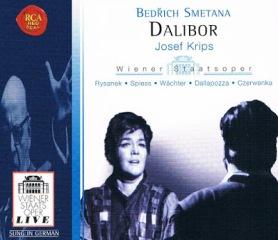Bedrich Smetana - Dalibor (Krips) [1969]
Bedrich Smetana - Dalibor (Krips) [1969]

1. Heut' richtet man hier Dalibor! 2. Entry of the King - Ihr wisst, wie lange dieses Konigreich 3. Erhebe nun die Klage 4. Wie, das ist er? Dies Dalibor? 5. Schwerer Verbrechen klagt man 6. Durch ein Verbrechen suchtest du 7. O Furst, ich flehe um sein Leben 8. O Gott, welch Aufruhr 9. Kein schoneres Leben is auf der Welt 10. Sag, Dalibors Geschick ist wohl bekannt 11. Hor mich gut an, was ich dir sage 12. Ach, wie traurig ist mein Geschaft 13. Alles ist fertig, geht nur hinein 14. Ist es wahr? 15. Interlude 16. War es ein Traumbild? 17. Knarrt da nicht die ture? 18. O ungeahntes Gluck der Liebe 19. Mein Herr und Konig 20. In spater Stunde 21. Seid Ihr zur Ende? 22. Interlude 23. Hort noch niemand die Zeichen der Geige? 24. Milada!... Wo bin ich? 25. Gefangen sind sie alle, bis auf ihn Vladislav, King of Bohemia - Eberhard Wächter (baritone) Dalibor - Ludovic Spiess (tenor) Milada - Leonie Rysanek-Gausmann (Soprano) Jitka - Lotte Rysanek (soprano) Budivoj, Lord of Castle – Oskar Czerwenka (bass) Bener, Jailer - Walter Kreppel (bass) Vitek - Adolf Dallapozza (tenor) Judge - Tugomir Franc (bass) Vienna State Opera Orchestra and Chorus Josef Krips – conductor
Dalibor is magnificently conducted by Krips who, with the VPO on best form, catches the full lyricism of Smetana's freedom-seeking opera. His cast could hardly be better, headed by Rysanek's impassioned, soaring Mlada and Spiess's virile, heroic yet sensitive Dalibor (oh, how we could do with a tenor of this thrilling calibre today!). Spiess surpasses even the legendary Blachut in the role. Imagine my chagrin then when the edition used heinously omits the hero's Act 3 song of freedom, one of the great passages in the work. Rysanek's younger sister Lotte, sounding uncannily like Leonie, makes much of little as Jitka. Waechter is splendid as the tortured king. The performance is in German, but no matter: this is an exciting set, in spite of the cuts. --- arkivmusic.com
Although Anton Dvorak is the most famous Czech composer, and his opera Rusalka argueably the most enjoyable, Bedrich Smetana, (1824-1884) can lay claim to being the father of modern Czech opera. And although Smetana's comic opera The Bartered Bride is perhaps his most famous opera, Dalibor is his dramatic masterpiece.
It tells the story of Bohemian knight Dalibor, sentenced to prison for killing the cruel Count Ploskovic, who had murdered Dalibor's best friend. Impressed by his statements at the trial, which talk of taking arms against an unjust monarch, the late Count's own sister Melada falls in love with Dalibor and vows to free him.
King Vladislav of Bohemia, informed that Dalibor's followers are planning an insurrection to free him, reluctantly follows the advice of his ministers and orders Dalibor executed. However Dalibor's followers storm the castle and set him free, but Dalibor is killed in the attempt.
This is a 1969 live production, sung in German, at the Vienna Staatsoper, where it was first performed in 1897 under the baton of Gustav Mahler, a chamption of Smetana's music. The cast is excellent, with the elegant bass Eberhard Wachter singing King Vladislav, Leonie Rysanek singing Melada, and the title role sung by tenor Ludovic Spiess. All the principals bring tremendous commitment and musicality to their roles, and Josef Crips conducts with his usual sensitivity and vigor. The sound quality is also quite fine.
The booklet contains no libretto, and the English translation of the German text contains surprising typos and is a little incomprehensible. (Hence the 4 stars.) Lovers of Czech opera should get this opera in its original language, but this is an excellent introduction to Smetana's great dramatic work and a chance to hear Leonie Rysanek in her prime. --- Steven Muni, amazon.com
download (mp3 @320 kbs):
yandex 4shared mega mediafire zalivalka cloudmailru uplea








